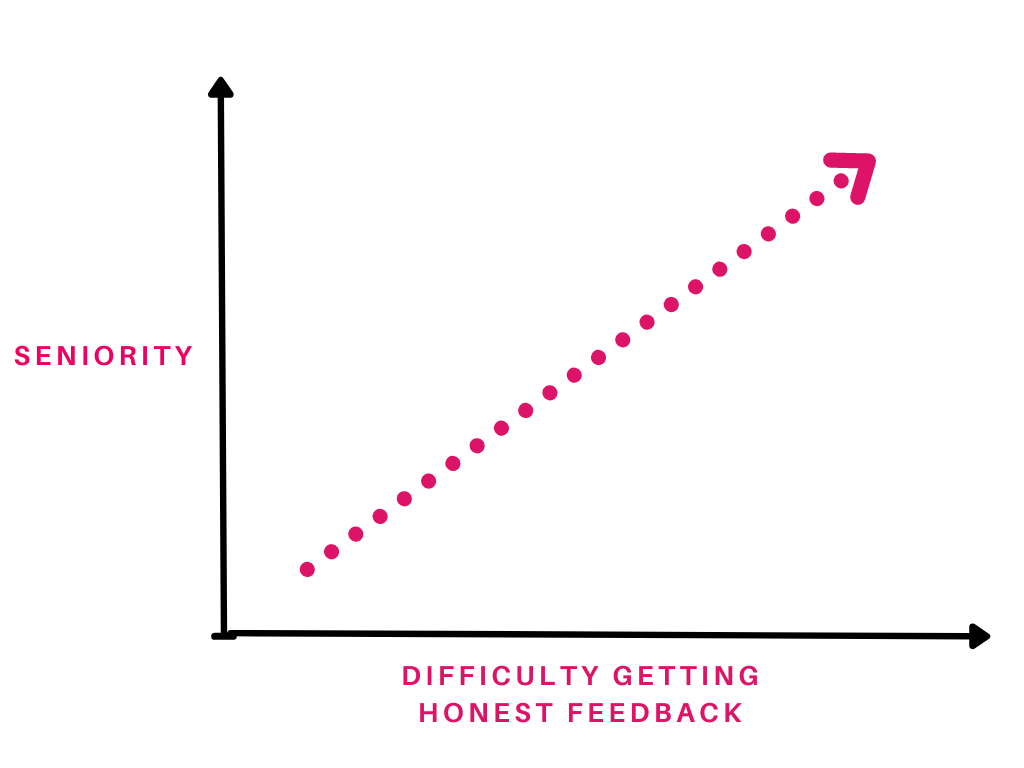How Leaders Can Get Better Feedback
Why the 'F' word is a challenge for leaders + 6 tools to make it easier
It can be difficult to get people to tell you what they really think.
And as you increase in seniority, it becomes even less likely that you’ll receive constructive and honest feedback from those around you.
Statistically speaking there are fewer people above you who will tell you what they see and what you need to work on. And for those beneath you, it takes a degree of braveness to be willing to upset your boss.
Mapped on a graph, the relationship between ease of feedback and seniority could be mapped like this.
The challenge is that the more senior and experienced you get, the more entrenched your good and bad leadership habits have the potential to become. Understanding your blind spots and honing your strengths is critical. Leaders need feedback.
Asking those around you using your company’s 360 platforms might get you so far. But to continuously improve, it must become part of how you do things, not a separate systemic activity that happens once a year or quarter.
The best leaders create an environment where open and constructive multi-directional feedback becomes the norm, day to day.
So, to help you get even better feedback, here are six tools that will get your leadership juices flowing.
Meantime if you haven’t already, you know what to do:
Model: In any given situation, there are experiences, behaviors, and qualities that you will choose to share with others and things that you keep to yourself. There are also things that others will see that you will not. The Johari Window Model is a simple tool that highlights the complexity of your relationship with yourself and others.
The most valuable and uncomfortable feedback can often focus on the right-hand side, rather than the left.
Think about the feedback you have received over the last six months.
Which quadrant of the grid did it focus on the most? Was it based on things that you were already aware of, or highlighting potential blind spots?
What could be driving that?
What can you change in your quest for feedback that would introduce a different focus?
Scale: Don’t just get feedback for yourself, get feedback on the performance of your leadership team too.
How is your leadership team or Board perceived by those around you relative to how you want to be seen?
What do people hope to get from you and what do they avoid bringing to you? Why?
What needs to happen to make a step change closer to where you want to be?
Question: Requesting feedback doesn’t need to be complicated. But it does need to be clear. Asking “Do you have any feedback?” is a surefire way to get a deflective and default ‘no’ in response. Instead, go for an open, but specific question. Target it to a specific goal you’re working on perhaps, or a relationship that you want to strengthen.
For example:
“What one thing could I do differently to help you get more out of our next leadership meeting?”
Action: Think of two interactions that you’ll have before the end of the week. Write down a question that you can ask at each, to request feedback.
Listen: Marcus Buckingham and Ashley Goodall of CISCO argue against the value of giving constructive and negative feedback in this 22-minute listen. It offers an interesting perspective that will challenge your thinking. Their HBR piece The Feedback Fallacy is also worth a read to help you consider the value of constructive feedback. What’s your view?
Read: Not all feedback is easy on the ear and if you want your team to feel comfortable giving you feedback, managing your internal and external reactions is paramount (regardless of whether you agree with the feedback or not).
This piece by Debra Roberts for Inc.com provides insightful tips on how to get comfortable asking and receiving feedback, even when it might sting.
Share: Leaders & their businesses who show they have turned feedback into action rate highly on employee engagement (80%); twice as high that is when compared to leaders & businesses who don’t translate feedback into action (40%).
The thing is, your team isn’t psychic and people often don’t notice the actions that you’ve taken. It takes a lot of change for them to notice a little. So if you want to find out how the changes you’re making are working and remind them of how their feedback is making a difference, you’ll need to be proactive.
What is the most important feedback that you've had from your team in the last two weeks?
What action have you taken as a result?
What opportunities exist to share those further with your team? When will you do it?
Last week’s issue: Your First Day Back To Work
If you found this week’s newsletter useful, I’d love it if you could share it with someone who needs a touch of inspiration. Just click on the button below.












